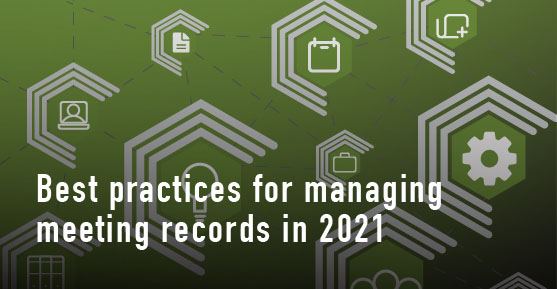Board portals are a great tool for facilitating meetings, and they also serve as repositories for documents, past meetings, and meeting minutes. Keeping records of past meetings is best practice for any organisation. But why would you keep records, what meetings should you keep a record of and how should these records be managed?
Why keep meeting records?
-
Compliance - Maintaining records of meetings, and meeting minutes, may ensure that you’re meeting your legal and regulatory compliance.
-
Accountability - Sometimes things go wrong. Being able to look back through past meetings to find out what was discussed can be very useful, not necessarily to blame anyone, but to be able to ensure the same thing doesn't happen again
-
Better Governance - Most senior and executive teams spend many hours in meetings every week. From time to time you may be required to perform an audit on your meetings to discover how your teams are spending their time and how to get the most out of these meetings. Having a record of past meetings is crucial for this.
Which records should be kept?
Each organisation is different, and therefore it is the organisations’ responsibility to decide which meeting records to keep. The records of meetings that include sensitive data, such as personal records are going to be managed differently to meetings with no sensitive information. Likewise, the record management of senior management meetings may be different to a mid-level employee meeting.
However an organisation decides to manage its records, it is important to take account of the legal and regulatory environment, the nature of its business, and its need for evidence and information about how decisions were made.
Some records have to be kept. The Companies Act 2006 (the Act) requires minutes of board meetings to be taken and kept for at least 10 years. The failure to comply with this is a criminal offence on the part of the directors. Section 249 of the Act stipulates that the meeting minutes are evidence of the proceedings at the meeting, unless the contrary is proved.
How should records be managed?
Within an organisation a specific person or group of people should be assigned the task to manage the records of meetings. This is so that there isn’t any confusion or double filing of meeting records. Ideally, records should be kept electronically, in a secure repository. Physical copies of meetings and meeting minutes take up space, are harder to retrieve specific meetings, and may be a security risk.
Once a system is in place to manage the records of meetings you should set a retention policy. For your retention period, take account of legal regulations. When titling your meeting records you should use a consistent format, so that meetings can be quickly retrieved, I'd recommend including the date in the title. You'll likely have hundreds of past meetings, so without consistent titles some meetings could get lost.
The management of meeting records is simple within Convene. The administrator has the ability to set a retention schedule for documents, meetings, and minutes. Once a retention schedule has been set, the files are stored in Convenes' secure library. All files are indexed in Convene, making past meetings and minutes easily searchable and retrievable. Furthermore, Convene allows you to set permissions at a high level of granularity, meaning that only those who have been given access can view past meetings.








